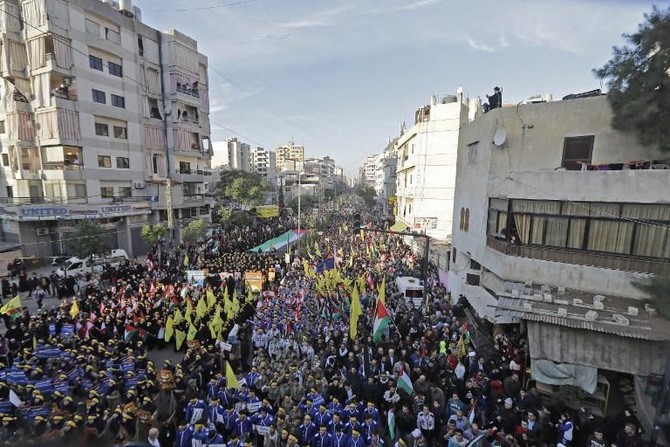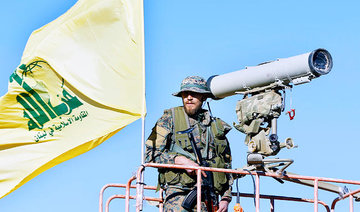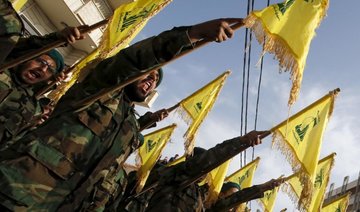BEIRUT: The US is taking a tougher line with the Lebanese banking sector on the funding of Hezbollah and Iran’s activities in Lebanon and the region.
A visit to Lebanon by Marshall Billingslea, US assistant secretary for terrorist financing, from Jan. 22-23, during which he met with political officials and bankers, indicated a new firmness by the administration.
A statement issued by the US Embassy about Billingslea’s visit mentioned Hezbollah and Tehran by name for the first time: previous statements about Treasury officials’ visits merely referred to the “application of US anti-terrorist financing laws” in general.
Dr. Ghazi Wazni, a Lebanese economist, told Arab News that a new penal code, which will be signed by President Donald Trump, is tougher than the previous law on monitoring and targeting. “It targets countries, companies, people and organizations outside Lebanon, which were not present in the previous law, that are linked to financing Hezbollah,” he said.
According to the statement from the US Embassy in Lebanon, Billingslea stressed “the importance of combating harmful Iranian activities in Lebanon, and the US commitment to helping Lebanon to protect the financial system from Hezbollah and Daesh and other terrorist organizations.”
Billingslea also urged Lebanon “to take all possible measures to ensure that Hezbollah is not part of the financial sector.”
“The statement of the assistant secretary of the treasury has two goals: To investigate the funding of Hezbollah activities because there are no reliable sources in the US Treasury for these activities, and the second is to exert political pressure by talking about Hezbollah’s involvement in illegal issues, including drug-trafficking or terrorist-financing,” Wazni said.
Wazni said that the timing of the visit and the American position “coincided with the creation of an American body charged with combating drug-trafficking, money-laundering and terrorism-financing. The Trump administration considers that the administration of his predecessor, Barack Obama, was lenient regarding the penal code on drug trafficking,” he said.
As for the impact of this American firmness on the Lebanese banking sector, Wazni said that the position of Billingslea does not threaten the banking sector because the US Treasury is aware that no financial operations relating to drug-trafficking and money-laundering get through Lebanese banks.
“Each banking process is monitored by correspondent banks in New York, which scrutinize every process and either freeze, approve or report it to the US Treasury. There is scrutiny by the Central Bank of Lebanon through the Special Investigation Commission and the Banking Supervision Committee and a third scrutiny by the banking sector itself, which established an auditing department to scrutinize each process.”
Wazni stressed that “there is no need to fear for the Lebanese banking sector, especially since the Parliament passed legislations which comply with high international standards, and the banking sector is fully committed to the decision of sanctions and the Parliament legislations are in line with international legislations, and the Central Bank issues circulars in this regard.”
Billingslea was keen, in a press conference held at the end of his visit, to note that “the law of preventing the international funding of Hezbollah does not target the Shiite community, but (it targets) the financial activities of Hezbollah all over the world, and it is important to distinguish between the Shiite community and the party and make sure that the (Shiite) community is treated fairly, and that its members can have banking services like everybody else.”
Arab News asked Hareth Suleiman, a political science professor at the Lebanese University and a member of the Independent Shiite Group, about the possibility of distinguishing between the Shiite community and Hezbollah in Lebanon and about the effects of the American sanctions on Shiites.
“It is hard to say that the Shiites have nothing to do with the two Shiite political groups: Hezbollah and Amal. And I do not think there is a difference in the issue of money-laundering between Hezbollah and Amal, and I have enough information and allegations about this, because money-laundering is going on in full swing within these two Shiite groups, and the creation of a safe haven for Shiites, away from the two groups, has many constraints due to the scarcity of potentials and the sense that the third group of Shiites is left without allies or support, and therefore the identification between the Hezbollah and Amal on the one side, and the ordinary Shiite citizen will continue because it is the stronger image.”
“The Shiite community has experienced similar crises at the time of hostage-taking, and the Lebanese Shiites were treated differently by the countries of the world, starting from reaching the airports until crossing to other countries,” Wazni said.
“The most dangerous thing now is if Hezbollah reaches a position, through the new electoral law, where it could hold the decision of the Parliament, the government, the security services, the Ministry of Justice and the military court. Then, the distinction between Lebanon and Hezbollah would be difficult.”
“To be able to distinguish between Hezbollah and other Shiites, we need facts that will control the boundaries of Hezbollah dominance,” he said. “If it’s left unchecked, the crisis would be felt by any Shiite citizen who wants to deal with the world.”
Lebanon expects tougher US action on banking sector to curb Hezbollah funding
Lebanon expects tougher US action on banking sector to curb Hezbollah funding

Syrian army declares Daesh-linked camp ‘closed security zone’

- Al-Hol is the largest camp for suspected Daesh relatives
- A military source said the army’s measure aimed to control security around the camp
DAMASCUS: Syria’s army announced Friday that a camp housing suspected relatives of Daesh group fighters was closed to the public, a measure a military source said was meant to bolster security around the facility.
Earlier this month, the army entered the vast Al-Hol camp after the withdrawal of the Kurdish-led Syrian Democratic Forces (SDF).
In a statement Friday, it said the area was a “closed security zone.”
Located in a desert region of Hasakah province, Al-Hol is the largest camp for suspected Daesh relatives and is home to some 24,000 people, mostly women and children, including 6,200 foreigners.
A military source told AFP the army’s measure aimed to control security around the camp and maintain order within it.
Some camp residents fled during the “security vacuum” between when the SDF withdrew and the army took control, two former employees of organizations working at the site told AFP last week.
In recent days, new reports emerged of attempts to flee the camp.
In the latest issue of its official Al-Naba publication — translated by the SITE monitoring group — Daesh called on supporters to free women held captive in Al-Hol.
In 2014, Daesh swept across Syria and Iraq, committing massacres and forcing women and girls into sexual slavery, but backed by a US-led coalition, the Kurdish-led SDF ultimately defeated the militants in Syria five years later.
The SDF went on to jail thousands of suspected militants and detain tens of thousands of their relatives in camps.
When the Syrian army took control of the camp, most humanitarian organizations withdrew, and aid has only been trickling in since.
The Save the Children charity warned on Friday that the humanitarian situation in the camp was “rapidly deteriorating as food, water and medicines run dangerously low.”
After Syrian government forces advanced against Kurdish forces, Washington said it would transfer 7,000 Daesh suspects, previously held by Syrian Kurdish fighters, to Iraq.
The transfer is still underway.














